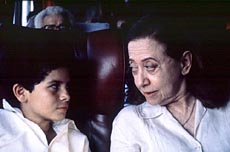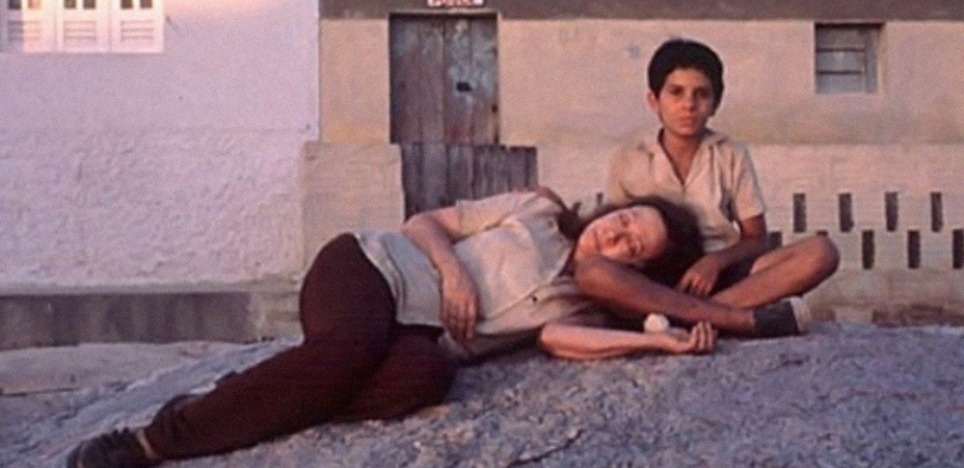All the world’s religions celebrate compassion as the response of an open heart to the suffering in the world. Central Station, a 1998 Brazilian film, centers on a woman who at first lacks any sign of this capacity. A retired schoolteacher and spinster, she earns her living writing letters for illiterate people in the Rio de Janeiro railroad station. She looks down her nose at her customers and has armored herself with cynicism and bitterness against feeling anything for them. Watching her undergo a dramatic change of heart over the course of the movie is very satisfying.
The Buddhist teacher Pema Chodron concludes in Start Where You Are: “True compassion does not come from wanting to help those less fortunate than ourselves but from realizing our kinship with all beings.” This dimension of compassion is beautifully conveyed in Central Station. The questions and exercises in this discussion guide are designed to draw out your feelings about family, ways of seeing others, pilgrimage, the bounties of compassion, and more.
Central Station runs 186 minutes and is rated R for language. For our review of the film and a plot synopsis, click here.
1. FAMILY
”It isn’t necessary to go out to the slums to find poverty and a lack of love. There is someone who suffers in every family,” Mother Teresa observed in The Gift of Prayer.
- How would you describe Dora’s relationship with her father? How has he stayed with her over the years? What are Josue’s hopes in regard to his father?
- What form of suffering did you experience in your family? In what ways has it left you somewhat impoverished?

2. NO BETTER OR WORSE THAN YOURSELF
"Compassion,” Timothy Miller writes in How to Want What You Have, "is the intention to see each human being as no better or worse than yourself, neither more nor less important, and fundamentally similar to yourself.”
- Share your reactions to Dora’s ridicule of the emotions in the letters she writes. What are some other indications in the drama that reveal her dislike of people?
- Discuss: One of the major blocks to the spiritual practice of compassion is judging people negatively and seeing yourself as separate from them.
3. ON THE ROAD
In one of her journals, French novelist Colette wrote: “I am going away with him to an unknown country where I shall have no past and no name, and where I shall be born again with a new face and an untried heart.”
- What does Dora learn about herself on the road with Josue? Look in particular at her encounter with the evangelical Christian truck driver.
- When has travel been a catalyst for change in you? Share your story.

4. PILGRIMAGE
Theologian Richard R. Niebuhr writing in Parabola magazine observed: “Pilgrims are persons in motion — passing through territories not their own — seeing something, we might call completion, or perhaps the word clarity will do as well, a goal to which only the spirit’s compass points the way.”
- What do you think happens to Dora when she wanders into a ceremony of Catholic pilgrims while she is looking for Josue?
- Have you ever been on a pilgrimage? What happened to you? Many pilgrims contend that pilgrimage places are transformed by the energy of the spiritual yearnings of the visitors and that they can feel how the invisible world touches the visible world there. Have you found that to be true?
5. LETTERS AS PRAYER
”We should keep alive and treat with respect the beautiful custom of letter writing,” Edward Hays notes in Secular Sanctity. "As we take time to do this, let us remember that such activity is always prayer. Let us remember that it is also prayer to receive and read a letter. Perhaps we could pause at the conclusion of having penned a note to a friend . . . and breathe part of our spirit into the envelope. More than just a puff of breath, we could send along with our message a part of our soul.”
- Talk about Dora’s transformed attitude toward letter writing after her experiences among the Catholic pilgrims. What do you see in her face and in the faces of those who come with their messages to the saints or to loved ones?
- What role does letter writing play in your relationship with loved ones or friends? Discuss your response to Hays’s understanding of writing and receiving letters as prayer.
6. THE BEATING OF YOUR HEART
"When a moment knocks on the door of your life,” wrote Russian novelist Boris Pasternak, “it is often no louder than the beating of your heart, and it is very easy to miss it.”
- What, in your view, is the magic moment in the drama when Dora opens her heart?
- What recent experience has opened the door of your heart a little wider?
7. HAPPINESS
"One cannot divine or forecast the conditions that will make happiness; one only stumbles upon them by chance, in a lucky hour, at the world’s end, somewhere, and holds fast to the days.” So wrote American novelist Willa Cather.
- How does Dora reveal that she has discovered new compassion for herself?
- Talk about the ways being a compassionate person has brought happiness into your life.

This guide is one in a series of more than 200 Values & Visions Guides written by Frederic and Mary Ann Brussat. Text copyright 2001 by Frederic and Mary Ann Brussat. Photos courtesy of Sony Pictures Classics. This guide is posted as a service to visitors to www.SpiritualityandPractice.com. It may not be photocopied, reprinted, or distributed electronically without permission from Frederic and Mary Ann Brussat — except it may be duplicated for use by groups participating in the e-course "Going to the Movies as a Spiritual Practice." For other uses and for a list of guides in the Values & Visions series and ordering information, email your name and mailing address to: brussat@spiritualrx.com.
